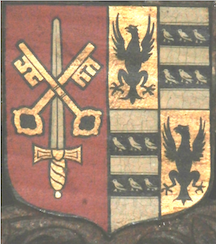Hide
hide
Hide
Transcript
of
Frederick Temple [Obituary]
Trans. Devon. Assoc. vol. XXXV, (1903), p. 40.
by
J. Brooking-Rowe (Ed.).
Prepared by Michael Steer

The brief obituary was read at the Association’s July 1903 Sidmouth meeting. Frederick Temple, archbishop of Canterbury and educational reformer was sometimes considered to personify, by his rugged appearance and terse manner as a schoolmaster and bishop, the ideal of “manliness”, or “muscular Christianity” fashionable during the Victorian era. In 1858, Dr Temple was appointed headmaster of Rugby School. When Bishop Henry Phillpotts died, Prime minister Gladstone appointed Temple, Bishop of Exeter. The appointment caused immediate controversy; the Archdeacon of Taunton, the Earl of Shaftesbury and others formed a strong committee of protest, while Edward Pusey declared that "the choice was the most frightful enormity ever perpetrated by a prime minister". Gladstone stood firm, and Temple was consecrated at Exeter on 21 December 1869 by the Bishop of London. There was murmuring among Devonshire clergy against what they deemed his harsh control, but his real kindness soon made itself felt, and, during the sixteen years of his tenure, he overcame the prejudices against him, so that when, on the death of Bishop Jackson in 1885 he was translated to London, the appointment gave general satisfaction. The Archbishop’s obituary, from a copy of a rare and much sought-after journal can be downloaded from the Internet Archive. Google has sponsored the digitisation of books from several libraries. These books, on which copyright has expired, are available for free educational and research use, both as individual books and as full collections to aid researchers.
Frederick Temple. Frederick Temple, the late Archbishop of Canterbury, was born 30th November, 1821. It would be out of place here to trace his career from penury, he having nothing but his ability and his indomitable temper to help him on, to a brilliant position. This has been done at great length elsewhere. Although he was born in the Ionian Islands, Devon claims him as one of her sons, and is proud to do so. He returned to the county in 1869 as Bishop of the Diocese; became a member of the Association in 1871, and was elected President in 1872 at the second Exeter meeting. The writer of this notice well remembers how with a thoroughness all his own Dr. Temple kept his place throughout the whole of the proceedings from beginning to end, presiding over every meeting, whether of the Council or of the members, and having something apt to say on every occasion, and at the close of the reading of each paper. He died at Lambeth Palace 23rd December, 1902.
